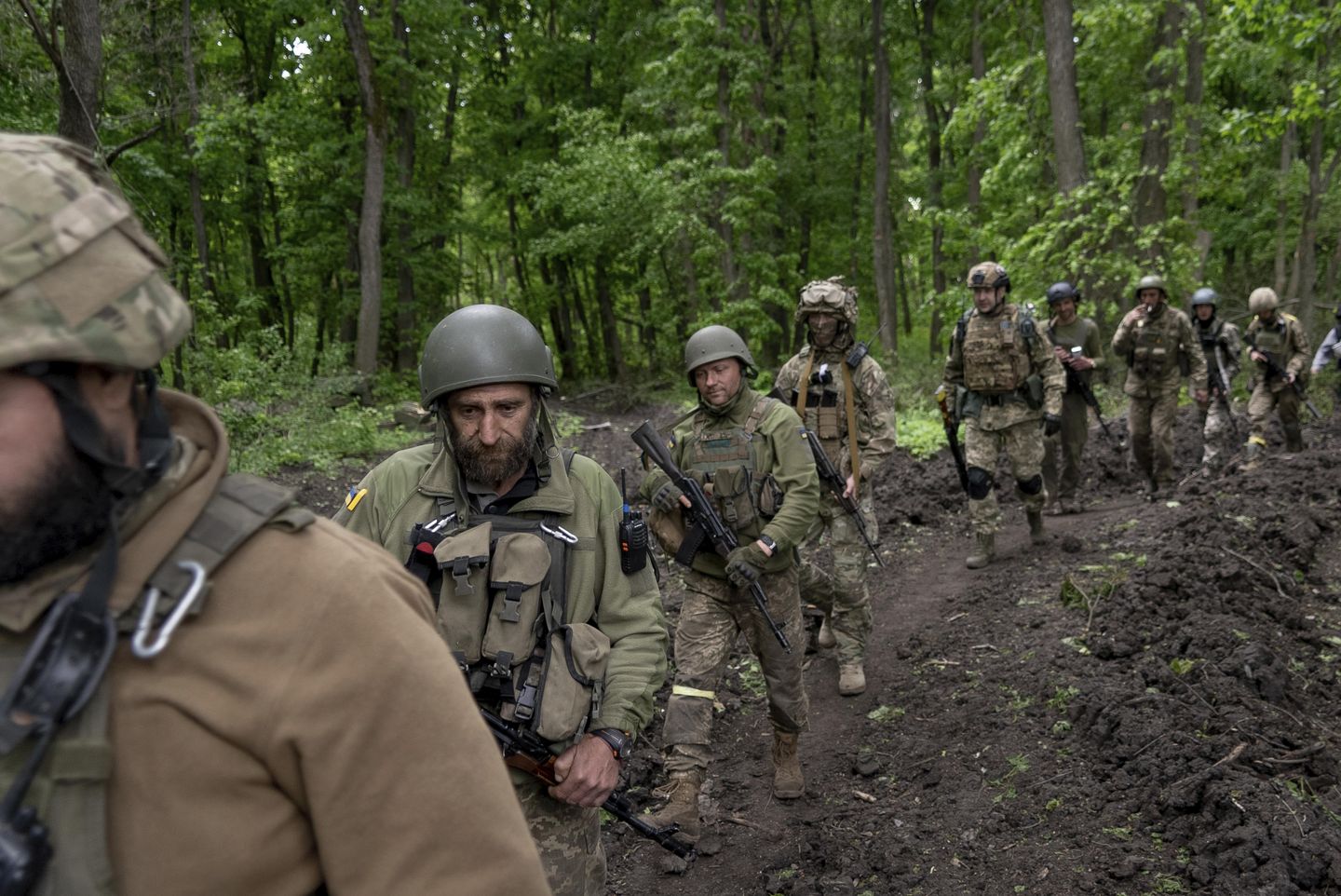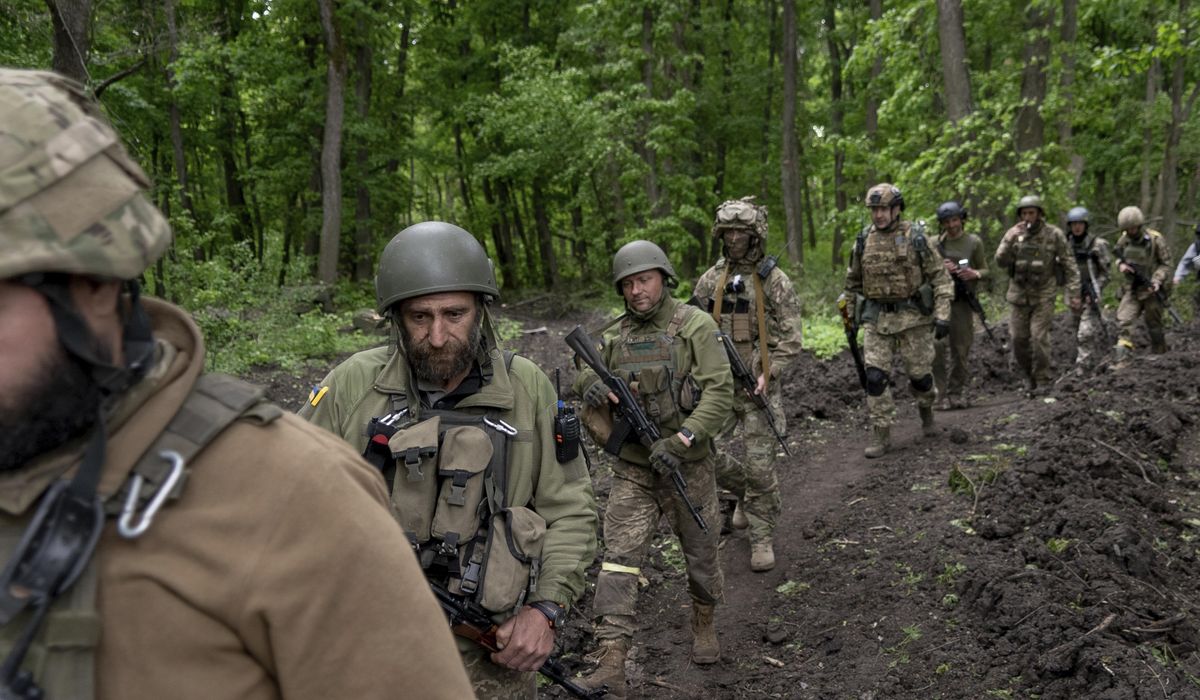

Russian forces faced fresh battlefield losses in eastern Ukraine Monday, as Sweden formally announced that it will follow its Nordic neighbor Finland’s lead and seek NATO membership, reversing more than two centuries of military nonalignment amid soaring security concerns that Russia’s invasion of Ukraine have sparked across greater Europe.
Sweden’s announcement came a day after Finnish leaders also formally announced their intention to join NATO, declaring a “new era” in Europe at a moment of mounting unease in Moscow, even as Russian President Vladimir Putin sought Monday to downplay the developments.
Mr. Putin has often claimed NATO’s eastward “expansion” since the end of the Cold War toward Russia is what prompted him to send his forces into Ukraine three months ago. Moscow has also repeatedly warned Sweden and Finland, which shares a more than 800-mile border with Russia, of repercussions should they pursue NATO membership.
But on Monday the Russian president insisted that Moscow “does not have a problem” with Sweden or Finland applying for NATO membership, but rather with the prospect of military equipment from other NATO member states being based in those countries going forward.
“The expansion of military infrastructure onto this territory will, of course, give rise to our reaction in response,” Mr. Putin said in remarks to a Russian-led military alliance of six ex-Soviet states. The comments came two days after the Russian president had warned his Finnish counterpart that Russo-Finnish relations would be “negatively affected” if Helsinki joins NATO.
The back and forth posturing has come as Ukrainian forces — fighting with weapons supplied by the United States and several other NATO nations — have continued to hold off Russian military offensives in Ukraine’s east and even started reclaiming some lost territory.
SEE ALSO: New age of war: Russia-Ukraine conflict reshapes battlefield
Western military officials said Monday that the campaign in eastern Ukraine that Russia launched after failing initially to seize the Ukrainian capital of Kyiv has now slowed to a snail’s pace, with Russian forces bogged down for a second time in the nearly 3-month-old war.
Ukraine’s military has most notably driven Russian forces from the outskirts of Kharkiv, the country’s second largest city, in recent days, claiming to have pushed all the way back in places to the Ukraine-Russia border.
Howitzers from the U.S. and other countries have helped Kyiv hold off or gain ground against Russia, a senior U.S. defense official said. The official, who spoke on condition of anonymity to discuss the U.S. military assessment, said Ukraine has pushed Russian forces to within a half-mile to 2.5 miles of Russia’s border but could not confirm if it was all the way to the frontier.
Video showed Ukrainian soldiers carrying a post that resembled a Ukrainian blue-and-yellow-striped border marker. Then they placed it on the ground while a dozen of the soldiers posed next to it, including one soldier with belts of bullets draped over a shoulder.
Ukrainian President Volodymyr Zelenskyy thanked the soldiers with his own video message. “I’m very grateful to you, on behalf of all Ukrainians, on my behalf and on behalf of my family,” he said. “I’m very grateful to all the fighters like you.”
Mr. Zelenskyy has separately warned that Russia forces continue to attack targets in the industrial heartland of Ukraine’s east known as the Donbas. The eastern city of Sievierdonetsk came under heavy shelling Monday that killed at least 10 people, according to a local official there. In another area of the east, the Donetsk region, an official said nine civilians had been killed in shelling on Monday.
SEE ALSO: Belarus stages troops near Ukraine, complicating Kyiv’s strategy, says U.K. intelligence
In another hot spot, Mr. Zelenskyy revealed Monday evening that some 260 wounded Ukrainian fighters had finally been evacuated from the besieged Azovstal steelworks in the port city of Mariupol.
The massive steelmaking compound was the final holdout from Ukrainian forces seeking to prevent a takeover by advancing Russian troops.
“We hope that we will be able to save the lives of our guys,” the Ukrainian president said of the evacuation.
The ongoing violence came a day after NATO Secretary-General Jens Stoltenberg declared that the war “is not going as Moscow had planned.”
“Ukraine can win this war,” the NATO chief said during a gathering of top diplomats from the alliance in Berlin on Sunday. Mr. Stoltenberg, who spoke via video link as he is recovering from COVID-19, called on alliance members to continue offering military support to Ukraine.
Erdogan objects
While he and other top NATO officials have said processing for Finland and Sweden to join the alliance could move very quickly, not all NATO member nations have openly embraced the two Nordic countries.
Most notably, Turkey has raised concern, claiming Finland and Sweden support Kurdish militants that Ankara considers terrorists. Mr. Stoltenberg had sought to downplay the issue Sunday, but on Monday Turkish President Recep Tayyip Erdogan ratcheted up his objections to Sweden and Finland. All 30 current members of NATO must endorse the new candidates before they can join.
Mr. Erdogan accused both countries of failing to take a clear stance against Kurdish militants and of imposing military sanctions on Turkey. “Neither country has an open, clear stance against terrorist organizations,” Mr. Erdogan said at a news conference. “We cannot say ‘yes’ to those who impose sanctions on Turkey, on joining NATO which is a security organization.”
The Turkish leader described Sweden as an “incubation center for terrorist organizations,” claiming some members of its parliament supported the outlawed Kurdistan Workers’ Party, or PKK. The group has waged an insurgency against Turkey since 1984, costing tens of thousands of lives.
Mr. Erdogan said Swedish and Finnish officials — who are expected in Turkey next week — should not bother to come if they hope to convince Ankara to drop its objections to their membership.
The comments came a day after Mr. Stoltenberg had sought to paper over the appearance of friction within NATO over the Finnish and Swedish membership bids, saying Sunday that his understanding was Turkey wanted to have its concerns addressed, but that Ankara had “made it clear that their intention is not to block membership.”
It remains to be seen how the dispute will play out, although Turkey has a history of publicly expressing its frustrations on the Kurdish issue. Ankara was, for instance, infuriated by U.S. support for PKK-linked Syrian Kurdish militants to fight the Islamic State group.
In other Russia-Ukraine developments Monday, McDonald’s confirmed Monday that it is selling its 850 restaurants in Russia. McDonald’s said it will seek a buyer who will employ its 62,000 workers in Russia, and will continue to pay those workers until the deal closes.
“Some might argue that providing access to food and continuing to employ tens of thousands of ordinary citizens is surely the right thing to do,” McDonald’s President and CEO Chris Kempczinski said in a letter to employees. “But it is impossible to ignore the humanitarian crisis caused by the war in Ukraine.”
McDonald’s said it’s the first time the company has ever “de-arched,” or exited a major market. It plans to start removing its signature golden arches and other symbols and signs with the company’s name. McDonald’s said it will also keep its trademarks in Russia and take steps to enforce them if necessary.
• This article is based in part on wire service reports.
